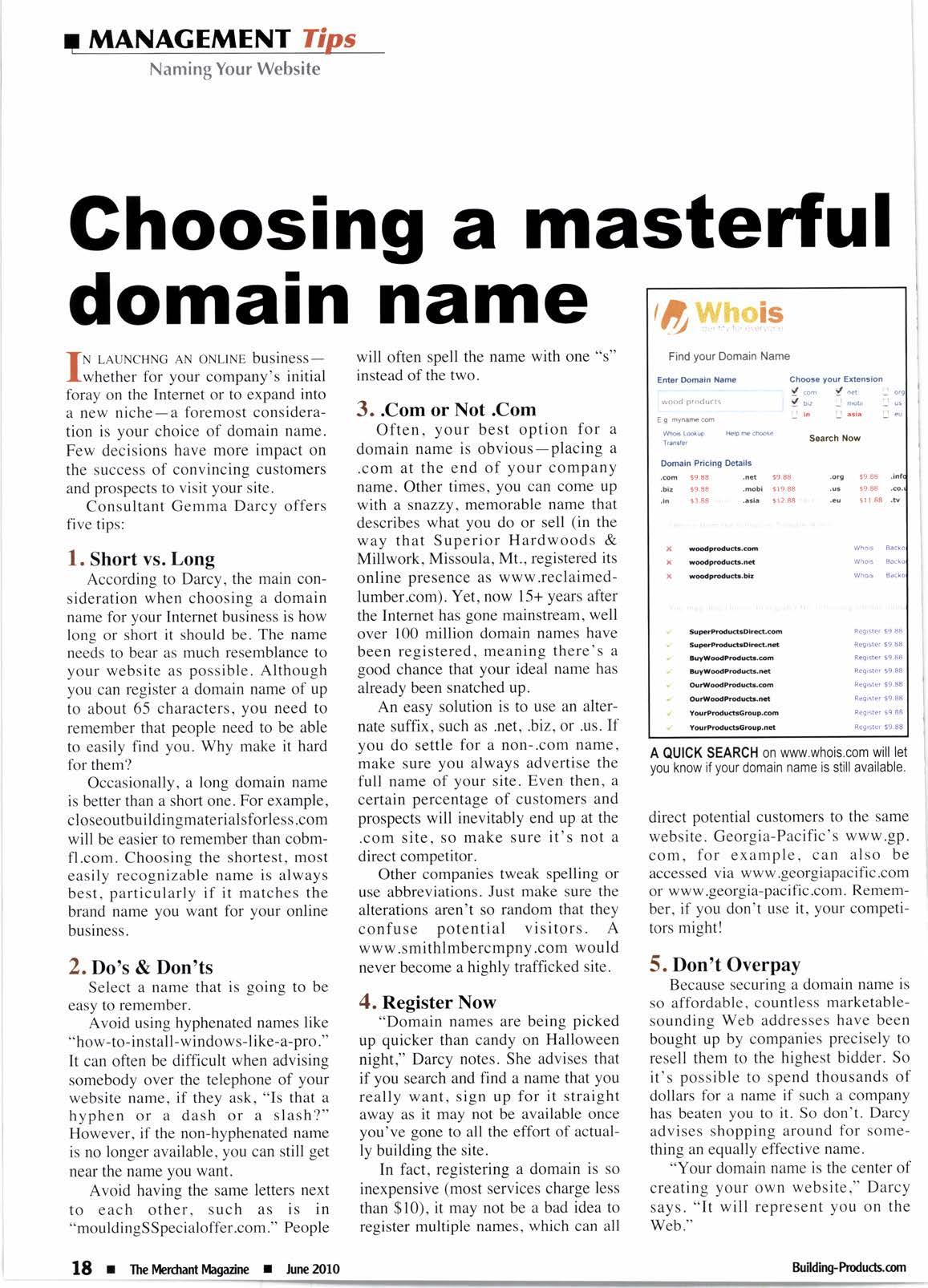
2 minute read
Ghoosing a masterful i domain name
fN uuNcHNG AN oNLINE businessIwhether for your company's initial foray on the Internet or to expand into a new niche-a foremost consideration is your choice of domain name. Few decisions have more impact on the success of convincing customers and prospects to visit your site.
Consultant Gemma Darcy offers five tips:
1. Short vs. Long
According to Darcy, the main consideration when choosing a domain name for your Internet business is how long or short it should be. The name needs to bear as much resemblance to your website as possible. Although you can register a domain name of up to about 65 characters, you need to remember that people need to be able to easily find you. Why make it hard for them?
Occasionally, a long domain name is better than a short one. For example, closeoutbuildingmaterialsforless.com will be easier to remember than cobmfl.com. Choosing the shortest, most easily recognizable name is always best, particularly if it matches the brand name you want for your online business.
2. Do's & Don'ts
Select a name that is going to be easy to remember.
Avoid using hyphenated names like "how-to-install-windows-like-a-pro." It can often be difficult when advising somebody over the telephone of your website name, if they ask, "Is that a hyphen or a dash or a slash?"
However, if the non-hyphenated name is no longer available, you can still get near the name you want.
Avoid having the same letters next to each other. such as is in "mouldingSSpecialoffer.com." People will often spell the name with one "s" instead of the two.
3. .Com or Not .Com
Often, your best option for a domain name is obvious-placing a .com at the end of your company name. Other times, you can come up with a snazzy, memorable name that describes what you do or sell (in the way that Superior Hardwoods & Millwork, Missoula, Mt., registered its online presence as www.reclaimedlumber.com). Yet, now 15+ years after the Internet has gone mainstream, well over 100 million domain names have been registered, meaning there's a good chance that your ideal name has already been snatched up.
An easy solution is to use an alternate suffix, such as .net, .biz, or .us. If you do settle for a non-.com name, make sure you always advertise the full name of your site. Even then, a certain percentage of customers and prospects will inevitably end up at the .com site, so make sure it's not a direct competitor.
Other companies tweak spelling or use abbreviations. Just make sure the alterations aren't so random that they confuse potential visitors. A www.smithlmbercmpny.com would never become a highly trafficked site.
4. Register Now "Domain names are being picked up quicker than candy on Halloween night," Darcy notes. She advises that if you search and find a name that you really want, sign up for it straight away as it may not be available once you've gone to all the effort of actually building the site.
In fact, registering a domain is so inexpensive (most services charge less than $10), it may not be a bad idea to register multiple names, which can all direct potential customers to the same website. Georgia-Pacific's www.gp. com, for example, can also be accessed via www.georgiapacific.com or www.georgia-pacific.com. Remember. if you don't use it. your competitors might!
A QUICK SEARCH on www.whois.com will let you know if your domain name is still available.
5. Don't Overpay
Because securing a domain name is so affordable. countless marketablesounding Web addresses have been bought up by companies precisely to resell them to the highest bidder. So it's possible to spend thousands of dollars for a name if such a company has beaten you to it. So don't. Darcy advises shopping around for something an equally effective name.
"Your domain name is the center of creating your own website," Darcy says. "It will represent you on the Web."










